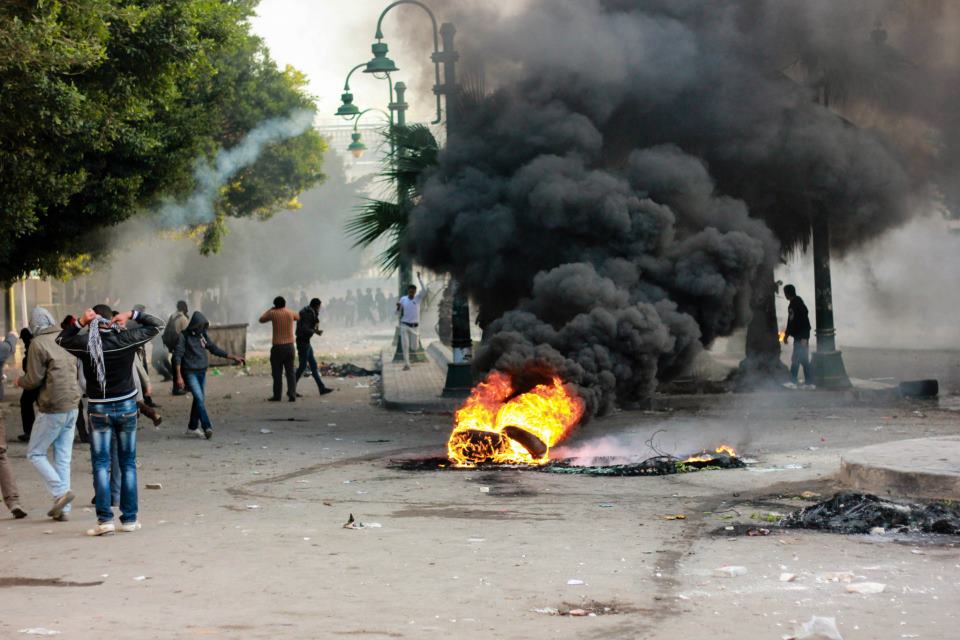
AFP – Sudanese poured into the streets after Friday prayers in a fifth day of demonstrations against fuel price hikes that have seen dozens shot dead and calls for the government’s overthrow.
The price hikes have sparked the largest protests of Omar al-Bashir’s 24-year rule, as young activists have invoked chants from the Arab Spring to call for the president’s downfall and security forces have been accused of gunning down more than 50 people.
Activists had called for stepped-up protests after the weekly Muslim prayers, and security forces responded with a massive deployment on the streets of the capital and other areas.
Around 2,000 protesters marched in Omdurman, the capital’s twin city, chanting anti-army slogans and calling for a halt to fuel price hikes, witnesses and an AFP correspondent said.
Police deployed in large numbers and watched from a distance as the demonstrators marched down a main thoroughfare chanting “Down to the army’s power” and “No to price hikes.”
Meanwhile, soldiers stood guard outside Khartoum petrol stations as long lines of cars waited to fill up after several stations were torched or shut down in recent days.
Internet access was cut for the second time this week, schools have been ordered closed until Monday and most shops remain shuttered, deepening the sense of crisis and sending residents scrambling to stock up on supplies.
“I want my family to have what we need because we don’t know where this is all going,” said Ahmad Hassan, 50, as he stocked up on canned goods.
Siding with the youth activists, the Al-Umma party of main opposition leader and former premier Sadeq al-Mahdi called for “the Sudanese people to step up the protests.”
Trying to maintain a blackout on the unrest, the authorities seized or blocked publication of three newspapers Friday, even though they are considered pro-government, journalists said.
The Al-Sudani and Al-Majhar al-Siassi dailies were seized at the printing press, they said, while Al-Watan was ordered not to print after covering the unrest in its Thursday edition.
The African Centre for Justice and Peace Studies and London-based Amnesty International said 50 people were killed after being shot in the head or chest on Tuesday and Wednesday.
“Local sources and activists have put the figure much higher, in excess of 100,” a joint statement said.
They also expressed “deep concern” about reports of hundreds being arrested and urged the authorities “to ensure that they are protected from torture and other ill-treatment.”
“Shooting to kill — including by aiming at protesters’ chests and heads — is a blatant violation of the right to life,” said Lucy Freeman, Africa deputy director at Amnesty.
The European Union said it was “concerned” about the reported deaths and called on all sides to avoid further violence.
“We particularly ask the Government of Sudan to respect the Sudanese people’s right to freedom of expression, freedom of the media and freedom of assembly,” a statement said.
Reports from Khartoum on Thursday said at least 29 people were killed after rioting erupted on Monday. Police confirmed the 29 fatalities without giving details, but medics and other sources said most had been shot dead.
The initial protests were staged on Monday in Wad Madani in Gezira state south of Khartoum, the scene of the first death, and later spread to Nyala, the capital of South Darfur state, and Khartoum itself.
“The people want the fall of the regime,” protesters, many of them students, have chanted in Khartoum, echoing the refrain of Arab Spring protests that toppled several governments in 2011.
Young activists called on demonstrators to keep up “the revolution and their protests” until the fall of the regime, urging the security forces to side with the people.
Petrol and diesel prices at the pump shot up on Monday after fuel subsidies were scrapped in an effort to reform the economy in Sudan, where inflation was already running at 40 percent.
Khartoum lost billions of dollars in oil receipts when South Sudan gained independence two years ago, taking with it about 75 percent of the formerly united country’s crude production.
As the protests swept the country, the foreign ministry denied Bashir has cancelled a trip to address the UN General Assembly, originally planned for Thursday.
The International Criminal Court has called on Washington to arrest Bashir, who is wanted by The Hague for alleged war crimes, crimes against humanity and genocide in Sudan’s Darfur conflict.



